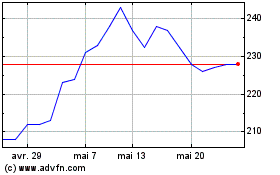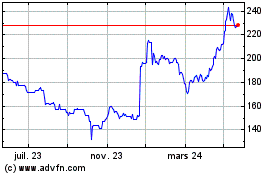Re Joint Venture
21 Mai 2002 - 9:00AM
UK Regulatory
RNS Number:1773W
Provalis PLC
21 May 2002
For Immediate Release 21 May 2002
Provalis plc
Provalis signs agreement with Cholestech Corp. for the Distribution of Glycosal
(R) in the USA and other major markets
Provalis plc (LSE: PRO and NASDAQ:PVLS), is pleased to announce that its Medical
Diagnostics division, Provalis Diagnostics Ltd, has signed a semi-exclusive
distribution agreement with Cholestech Corp. for Glycosal(R), its leading
diabetes A1c diagnostic product. Under the terms of the agreement, Cholestech
will promote, distribute and sell Glycosal, under its trademark Cholestech GDX
(TM), in the major diabetes markets of the USA, Japan and Europe, as well as in
much of the rest of the world. Provalis has retained the right to sell Glycosal
through its own sales division in the United Kingdom.
Commenting on the announcement, John Curtis, Managing Director of Provalis
Diagnostics, said, "Cholestech, which is based in Hayward, California, is a
point of care diagnostics company which had sales of approximately US $50
million in its last financial year. Cholestech focuses on providing diagnostic
tools to doctor's offices and a broad range of healthcare professionals. In
addition, it has a number of marketing relationships with Pharmaceutical
companies, through its' WellCheck(TM) business unit, which supports patient
screening events. We believe that Cholestech is ideally positioned to exploit
the growing opportunities for Glycosal in the point of care market, particularly
in the USA which represents around 40% of the worldwide diabetes testing market
".
Phil Gould, CEO of Provalis plc, added, "The worldwide commercialisation of
Glycosal, which now benefits from the recently announced CLIA waiver and NGSP
certification, through strong sales players is crucial to the development of our
Medical Diagnostics division. In partnership with Cholestech, which has an
established position in the point of care market through its worldwide
distribution network, and Bio-Rad Laboratories Inc, our other distributor, we
are now in a position to fully capitalise on the leading position Glycosal has
given Provalis in the diabetes A1c testing market"
Warren E. Pinckert II, President and Chief Executive Officer of Cholestech, said
"Our agreement with Provalis is an important step in our effort to broaden
Cholestech's product line and expand our presence in both the professional and
health promotion markets. We plan to introduce the product at the American
Diabetes Association's annual meeting in San Francisco in June."
- END -
For further information: -
Dr Phil Gould, Provalis plc, Tel: 01244 833463
Mr John Curtis, Provalis Diagnostics, Tel 01244 833542
Mr Lee Greenbury, Provalis plc, Tel: 01244 833402
Lisa Baderoon, Buchanan Communications, Tel: 020 7466 5000
Provalis' Internet Website ; http://www.provalis.com
"Safe Harbor" Statement under the US Private Securities Litigation Reform Act of
1995: Statements in this announcement that relate to future plans, expectations,
events, performances and the like are forward-looking statements as defined in
the US Private Securities Litigation Reform Act of 1995. Actual results of
events could differ materially from those described in the forward-looking
statements due to a variety of factors. Such factors include, among others: the
success of the Group's research and development strategy; uncertainties related
to future trial results and the regulatory process; the execution and success of
collaborative agreements with third parties; the impact of future laws,
regulations and policies; the Group's intellectual property position and the
success of patent applications for its products and technologies; stock market
trends in the Group's sector; the Group's dependence on key personnel; general
business and economic conditions; and other factors beyond the Group's control
that may cause the Group's available capital resources to be used more quickly
than expected. These and other factors that could affect the Company's future
results are more fully described in its filings with the US Securities and
Exchange Commission, in particular the latest 20-F filing, copies of which are
available from the Company Secretary at the Company's registered address.
Notes to Editors
Provalis plc (LSE.PRO and NASDAQ.PVLS) is a healthcare company with three
separate divisions:-
Medical Diagnostics - develops and sells to world markets medical diagnostic
products for chronic disease management. The division's principle products are
Glycosal(R) and Osteosal(R) in the areas of diabetes and osteoporosis
respectively.
Healthcare - sells and markets its own, and third party, branded, prescription
medicines in the UK to GPs and hospitals through its own regionally managed
sales force. The division sells products in the areas of muscular-skeletal
disorders, gastroenterology, osteoporosis, migraine and dermatology.
Therapeutics R&D - develops a range of vaccine candidates for the prevention of
infectious diseases through a network of research collaborators.
Cholestech is committed to enabling people to lead longer, healthier and more
active lives. Cholestech's Diagnostic Products and WellCheck(TM) business units
provide easy to use, accessible diagnostic tools and information to health care
practitioners in over 35 countries around the world. Cholestech offers
efficient and economic diagnostic testing for cholesterol and related lipids,
blood glucose and glycemic control, and liver function at the point of care.
Health care providers can use the CLIA-waived Cholestech LDX(R) and GDX(TM)
Systems to initiate and monitor the progress of patient therapy. By providing
effective disease management solutions, Cholestech's goal is to be a leading
provider of diagnostic tools and information for immediate risk assessment and
therapeutic monitoring of heart disease and diabetes.
Glycosal(R)
Providing accurate, real-time results outside of the laboratory, Glycosal is
suitable for point-of-care use in the physician's office or diabetes clinic, as
well as for home testing by prescription. Glycosal eliminates the need for
expensive laboratory instruments or tedious training procedures, removing cost
and complexity as barriers to decentralized A1c testing and monitoring. The key
facts are:-
Glycosal is a simple, four minute, test for A1c
Glycosal can be used by diabetic clinics, G.P.s and nurses at the
"point-of-care"
Glycosal is certified by the European Reference Laboratory
Glycosal is CLIA waived in the USA, and has NGSP certification
The current global clinical laboratory market for A1c testing is approximately
US$800 million
The tighter control of diabetes is associated with the reduction of risk of
debilitating long term complications
Glycosal is now distributed throughout the world by Cholestech Corp. and Bio-Rad
Laboratories Inc.
A1c
A1c, or HbA1c as it is also known, is formed when haemoglobin in red blood cells
binds glucose over the cells' typical 90-day life span. The quantitative
measure of A1c has been well established as a way to determine a patient's long
term glycemic control profile. Unlike daily glucose monitoring, which provides
a 'snapshot' of a patient's glucose level at the time of testing, A1c provides
an average level over the previous 90 days and therefore indicates the long-term
progress of a diabetics disease and therapy management.
The American Diabetes Association (ADA) recommends that an A1c test be performed
every three-to-six months in all diabetes patients to determine how well glucose
has been controlled over that period of time. The objectives are to document
blood glucose control at the initial assessment and to assess the effectiveness
of continuing care. As a percentage of total blood haemoglobin, the goal is to
maintain an A1c level of 7% or lower. Owing in part to infrequent testing, the
vast majority of diabetic patients have an A1c level well in excess of the
recommended 7% and are at a higher risk of developing serious complications.
Diabetes
Diabetes mellitus is a group of diseases characterized by high and fluctuating
levels of blood glucose. It results from defects in insulin secretion, insulin
action, insulin resistance, or a combination of all three. The disease can lead
to serious complications and premature death. People with diabetes can reduce
such occurrences by maintaining proper blood glucose levels through diet,
exercise, medication and monitoring. Type 1 and Type 2 diabetes are the most
common forms. Type 2 constitutes 90 percent to 95 percent of all cases; type 1
is an autoimmune disease in which the body makes no insulin. Type 2 diabetes is
a metabolic disorder usually found in people over the age of 30. In the Unites
States, it is recognised that nearly half of all people with Type 2 diabetes
remain undiagnosed.
Products used in testing patients with diabetes, which affects about 6 percent
of the world's population, have a compounded annual revenue growth rate of 15
percent, making them the fastest growing product segment in the in vitro
diagnostic (IVD) industry. Diabetes continues to reach epidemic proportions,
with nearly 150 million suffering worldwide (10 million Americans) with direct
and indirect costs in the United States alone of almost $100 billion annually.
Indirect costs of $55 billion include disability, work loss and premature
mortality. At about $3 billion per year, glucose-monitoring products represent
a large percentage of direct expenditures.
Diabetes can lead to complications including heart disease, stroke, high blood
pressure, blindness, nerve damage, kidney damage, periodontal disease,
amputation, congenital malformations incurred during pregnancy and diabetic
coma. People with diabetes are more susceptible to many other illnesses, such
as pneumonia and influenza. The risk of death from these illnesses and
complications is significantly greater than that for the general population.
According to the ADA, the death rate from diabetes has increased by 50 percent
since 1985, while death rates from heart disease and stroke have been declining.
Some population groups are at higher risk for diabetes as they age. The risk
factors are family history, age, sex and ethnic background. Obesity, unhealthy
diet and a sedentary lifestyle increase disease prevalence.
CLIA
In the USA, Congress passed the Clinical Laboratory Improvement Amendments
(CLIA) Act in 1988, establishing quality standards for all laboratory testing to
ensure the accuracy and reliability of all laboratory tests, regardless of where
the test was performed. The CLIA regulations are based on the complexity of the
test method, and the more complex the test method, the more stringent the
requirements are for the laboratory which carries out the test. Test methods are
assessed by the FDA and the Centers for Medicare & Medicaid Services and
assigned one of three complexity ratings, namely, waived test, moderately
complex test and highly complex test. For a test to be designated as waived it
must be so simple and accurate as to render the likelihood of obtaining an
erroneous result as negligible.
The National Glycohemoglobin Standardisation Program (NGSP)
The National Glycohemoglobin Standardisation Program is an independent quality
assessment of the performance of any test for the analysis of A1c.The program is
run by the University of Missouri and compares the results from the
manufacturer's method with a reference method. Manufacturers meeting the
exacting standards of the NGSP are certified by the University and may advertise
their products as conforming to NGSP during the period of certification.
The assessment is carried out each year and determines precision of the test
over a 20 day period and the accuracy as compared to a reference method carried
out by a national reference laboratory. Standards are extremely tight the
precision pass criteria being a 5% coefficient of variation over the entire 20
day period.
The importance of the certification is demonstrated by the fact that the
American Diabetes Association only recommends, and many health care providers
will only use, tests that are NGSP certified.
This information is provided by RNS
The company news service from the London Stock Exchange
Globaldata (LSE:DATA)
Graphique Historique de l'Action
De Juil 2024 à Août 2024

Globaldata (LSE:DATA)
Graphique Historique de l'Action
De Août 2023 à Août 2024
